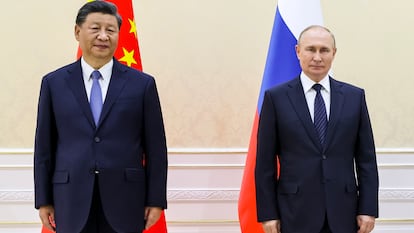Putin-Xi talks: Russian leader concedes China has ‘concerns’ over Ukraine war
The statement, made during a face-to-face meeting in Samarkand, is the first sign that Beijing is seeking to distance itself from Moscow


Russian President Vladimir Putin recognized for the first time that China has “questions and concerns” about the situation in Ukraine. “We highly value the balanced position of our Chinese friends when it comes to the Ukraine crisis,” Putin said. “We understand your questions and concerns about this. During today’s meeting, we will of course explain our position,” he told Chinese President Xi Jinping during their first face-to-face talks since Moscow invaded Ukraine at the end of February and turned world geopolitics upside down.
The Russian president’s statement, which for the first time hint at Beijing’s concern about the Ukraine war, have opened a small and cryptic rift with the Asian giant, which until now has maintained a calculated distance from Moscow: it has not provided Russia with material or military support, but not has it condemned the invasion either.
During the meeting, which took place in Samarkand, Uzbekistan, the heart of the old Silk Road, Putin denounced Western attempts to create a “unipolar world” and praised Beijing’s “balanced position” on Ukraine. The readout released by Chinese state news agency Xinhua, however, did not touch on Ukraine. According to the release, Xi said China “willing to work with Russia to demonstrate the responsibility of big powers” and to “instill stability and positive energy in a world of chaos.”
The anticipated meeting took place amidst the Shanghai Cooperation Organization (SCO) summit. The SCO was established after the fall of the Soviet Union and focuses on security issues. In addition to Russia and China, Kazakhstan, Uzbekistan, India, Kyrgyzstan, Pakistan and Tajikistan are also members. According to Reuters, Putin called on Xi to strengthen that organization.
With Europe closing its door to Russia, Putin has shifted his focus to Asia. The meeting with Xi came at a critical time for Russia. Russian troops are losing ground to the Ukrainian counterattack, and Moscow is increasingly feeling the squeeze of international sanctions. For Xi, the trip itself was an event: it was his first travel abroad since the Covid-19 pandemic began.
The last time the two leaders met, on February 4, the encounter led to a bombshell: Beijing and Moscow signed a joint statement that questioned the current framework of world power relations and consecrated a “no limits” friendship, in which “there are no ‘forbidden’ areas of cooperation.” Just 20 days later, Russian tanks crossed the Ukrainian border.
Last week, China’s neutrality skewed even further toward Russia. During an official visit, Li Zhanshu, the third-highest official on the Politburo Standing Committee (the Chinese Communist Party’s most important body), expressed his support for Russia: “On the Ukraine issue, for example, the United States and NATO are expanding directly on Russia’s doorstep, threatening Russia’s national security and the lives of Russian citizens,” he told Russian lawmakers, according to a video circulated by the Russian Duma. “Given the circumstances, Russia has taken necessary measures. China understands, and we are coordinating on various aspects,” he added, according to Newsweek’s translation of the recording. “I believe Russia was cornered. In this case, to protect the core interests of the country, Russia gave a resolute response.”
Relations between two of the world’s largest powers have become a source of growing concern in Washington and Brussels. Tensions over Taiwan, the self-ruled island that China considers an inalienable part of its territory, have intensified concerns. Indeed, the West believes that Taiwan could potentially become a conflict similar to the one in Ukraine. These tensions were exacerbated by US Speaker of the House of Representatives Nancy Pelosi’s August visit to Taipei; her trip outraged Beijing, which responded by conducting threatening military drills near the Taiwan Strait.
The Taiwan crisis also hovered over the meeting between the Russian and Chinese leaders. Putin sought to align the two countries’ positions by condemning the “provocations by the United States and their satellites in the Taiwan Strait.” He went on to assert that Moscow will adhere to the “one China” policy, a complex linguistic and political balance. Beijing understands the concept to mean a single Communist-ruled Chinese country, of which Taiwan is an inalienable part. However, other governments, such as the United States, interpret it to mean that Beijing is China’s legitimate government, but Taiwan’s status remains undefined.
Tu suscripción se está usando en otro dispositivo
¿Quieres añadir otro usuario a tu suscripción?
Si continúas leyendo en este dispositivo, no se podrá leer en el otro.
FlechaTu suscripción se está usando en otro dispositivo y solo puedes acceder a EL PAÍS desde un dispositivo a la vez.
Si quieres compartir tu cuenta, cambia tu suscripción a la modalidad Premium, así podrás añadir otro usuario. Cada uno accederá con su propia cuenta de email, lo que os permitirá personalizar vuestra experiencia en EL PAÍS.
¿Tienes una suscripción de empresa? Accede aquí para contratar más cuentas.
En el caso de no saber quién está usando tu cuenta, te recomendamos cambiar tu contraseña aquí.
Si decides continuar compartiendo tu cuenta, este mensaje se mostrará en tu dispositivo y en el de la otra persona que está usando tu cuenta de forma indefinida, afectando a tu experiencia de lectura. Puedes consultar aquí los términos y condiciones de la suscripción digital.








































